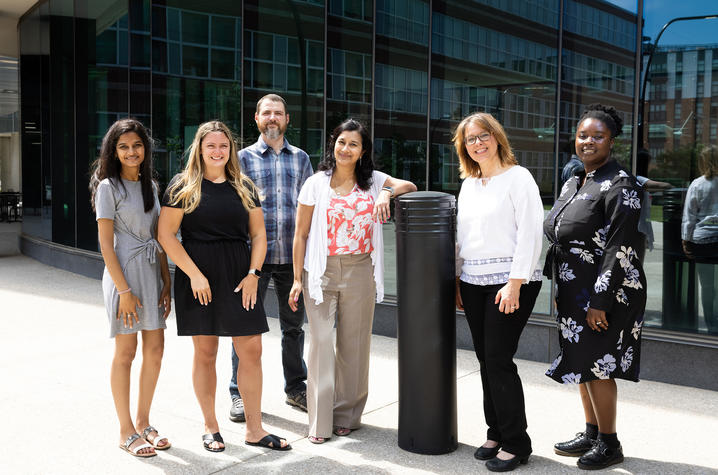UK Study to Reveal Health Equity Impacts of Flavored Tobacco Sale Restrictions
LEXINGTON, Ky. (June 22, 2021) — A new University of Kentucky College of Medicine study will examine how policies that restrict the sale of flavored tobacco products including menthol cigarettes impact health disparities among vulnerable populations.
A five-year, $2.8 million grant from the National Cancer Institute (NCI) will support the study on how local policies impact at-risk groups — including communities of color, low-income populations and youth — that are more likely to use flavored tobacco products.
The results could help lawmakers create policies that are more equitable, says the study’s principal investigator Shyanika Rose, Ph.D., a faculty member of the Center for Health Equity Transformation (CHET), assistant professor in the Department of Behavioral Science and member of the Markey Cancer Center Cancer Prevention and Control Program.
“We already know that stopping the sale of these products can reduce their availability and use in these communities,” said Rose. “But understanding the impact of policies across race and socioeconomic status will give guidance about what kinds of policies work and have the most equitable benefits.”
Rose says flavored tobacco products, which are more appealing, easier to use and more addictive, have a long history of being disproportionately marketed toward vulnerable communities, particularly African Americans. According to the Truth Initiative, nearly 90% of all Black smokers use menthol cigarettes, and more than 39,000 African Americans die from tobacco-related cancers each year.
Currently, federal laws only prohibit the sale of certain flavored tobacco products. The sale of menthol cigarettes and all flavors of smokeless tobacco, cigars and hookah is still permitted. While the Food and Drug Administration recently announced new steps to implement a ban on the sale of menthol cigarettes and flavored cigars, the proposal will not eliminate all flavored tobacco products from the market, specifically flavored e-cigarettes and e-liquids.
In the absence of broad-based federal laws, several state and local jurisdictions across the country have enacted their own policies. Rose says about 30% of localities with a policy have a comprehensive one that prohibits the sale of all flavors, including menthol, across all tobacco products.
“While the FDA is moving federal policy in the right direction, comprehensive policies that restrict the sale of all flavored tobacco products may be more likely to protect the health of the most vulnerable populations and this is something this project will investigate,” Rose said.
Rose’s team will examine these local policies and expand the evidence base about how well they work to decrease access to flavored tobacco products, exposure to associated marketing materials and ultimately reduce tobacco use. Their findings will be used to help inform community leaders about how policies can help to eliminate health disparities.
The project will use a large longitudinal national cohort of youth and young adults to identify tobacco use outcomes among those exposed to local policies and those who are not. The team will also explore the relationship between flavored tobacco marketing exposure and initiation of use among young non-tobacco users and continued use among young tobacco users who will be tracked in real time in eight communities with different types of flavor policies.
Marketing exposure and tobacco use outcomes in both the national dataset and the local data collection will then be evaluated based on socioeconomic status and race/ethnicity of respondents.
Rose’s research team is composed of UK experts across several disciplines including W. Jay Christian, Ph.D., assistant professor in the UK College of Public Health’s Department of Epidemiology; Mary Kay Rayens, Ph.D, professor in the UK College of Nursing; and Melinda Ickes, associate professor and director of Graduate Studies in the UK College of Education’s Department of Kinesiology and Health Promotion.
Ickes, who will be leading the outreach and dissemination component of the study, says the lessons learned will be shared in an ongoing dialogue with community partners. The partners will help develop tailored messages about the risks of flavored tobacco products to generate broader public policy support and deter use among youth in their communities.
“I am truly excited to work with Dr. Rose on this innovative and meaningful project,” Ickes said. “Engaging community members and ensuring their voices are heard throughout the research process will enhance the quality and meaning of the research. We also know that through participatory and inclusive efforts, community members can be change-makers to affect policy change in the direction of health for all people.”
The team will partner with the Truth Initiative, experts from Stanford University and the University of Southern California, national flavored tobacco policy experts and an advisory committee of local representatives from eight communities with different types of flavor policies. Findings will be shared with those communities and others that are considering a local policy restricting the sale of flavored tobacco products.
Rose says engagement with the community partners is beginning, secondary analysis on national data will start this year and recruitment of youth and young adults in the eight communities will begin in 2022.
Research reported in this publication was supported by the National Cancer Institute of the National Institutes of Health under Award Number 1R01CA251478. The content is solely the responsibility of the authors and does not necessarily represent the official views of the National Institutes of Health.
As the state’s flagship, land-grant institution, the University of Kentucky exists to advance the Commonwealth. We do that by preparing the next generation of leaders — placing students at the heart of everything we do — and transforming the lives of Kentuckians through education, research and creative work, service and health care. We pride ourselves on being a catalyst for breakthroughs and a force for healing, a place where ingenuity unfolds. It's all made possible by our people — visionaries, disruptors and pioneers — who make up 200 academic programs, a $476.5 million research and development enterprise and a world-class medical center, all on one campus.






